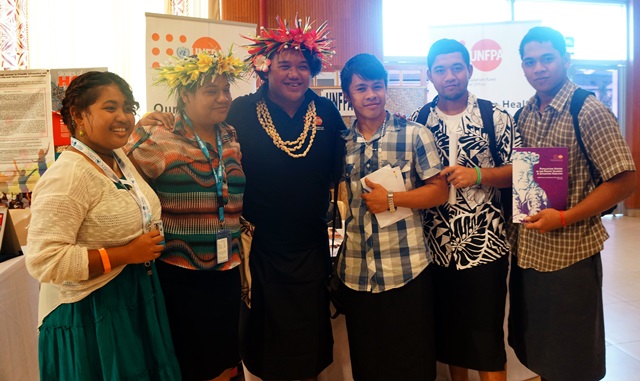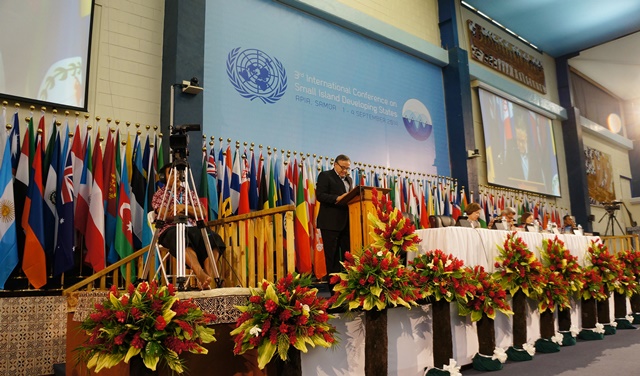A document which specifies the aspirations of young people in small island developing states, the T.A.L.A.V.O.U (Towards A Legacy of Achievements, Versatility, opportunity, Through Partnership and Unity) Forum Outcome, an achievement of the 3rd Conference of Small Island Developing States (SIDS) pre-conference youth deliberations has been endorsed.

The document reflects aspirations of young people who live in SIDS and are grappling with issues characteristic of small island states like the impact of climate change and/or the double-digit adolescent fertility rates which impacts food security.
Young people do not intend to remain observers of decision-making processes of their countries and the TALAVOU emphasizes that young people want to be considered partners of today. Participants of the youth pre-conference meeting want to make history the cliché ‘leaders of tomorrow'; they are already active participants, they argue and can be effective agents of change if provided the appropriate support.
The youth cohort of SIDS, 18 of whom were supported to attend by the UNFPA Pacific Sub-Regional Office and the Papua New Guinea Country Office, want to continue contributing to solutions for issues their countries and leaders are dealing with.
The TALAVOU statement reiterated that young people living in SIDS wanted to see for each of their countries: A self-sustaining, climate resilient, peaceful, healthy, inclusive, responsive, democratic and transparent society where all people are empowered as equal partners in global efforts for sustainable development.
The youth cohort called for strong mechanisms, legal frameworks and financial support for inclusive and active participation of young people in policy-making and planning processes; they want fundamental structural shifts to ensure gender equity and end gender-based violence.
The document provides specific aspirations under the topic of health; climate change and biodiversity; water, ocean and sustainable energy; education, entrepreneurship and employment; and science and technology; it includes region-specific (AIMS, Caribbean and Pacific) provisions.
Under the rubric Health, the youth have specifically called for: "Action to overcome social, cultural, regulatory and discriminatory barriers that prevent young people from accessing quality and youth-friendly health services and sexual and reproductive health and rights information, services and safe spaces with appropriate comprehensive sexual education in both formal and informal settings, rural and urban areas."
It is encouraging to note the drive this young cohort of leaders have in ensuring this fundamental aspect of life for how can we achieve all other indicators of societal progress if fundamentally, our populations cannot live and enjoy their sexual and reproductive health and rights, without fear or prejudice.
You may ask what exactly is sexual and reproductive health and rights, and how exactly is it a prerequisite for society's progress.
Sexual and reproductive health refers to a state of complete physical, mental and social well-being, not merely the absence of disease or infirmity relating to the reproductive system and its functions and processes, and in relation to a positive and respectful approach to sexuality and sexual relationships: that everyone has the right to pleasurable and safe sexual experiences, free of coercion, discrimination and violence.
Our collective responsibility at all levels of society is ensuring enabling environments that will allow lived sexual and reproductive health and rights, for example societies where couples can decide how many children they want and be able to have them at a frequency they prefer, based on their household resources. Additionally, once they have decided that, an enabling environment would ensure they can access contraceptives, a critical aid to their plan.
Countries which ensure timely and correct sexual and reproductive health and rights' information and services eventually see the benefits of this at national level because as population growth stabilizes at a sustainable rate and individuals are of good health and empowered through higher education, pressure on resources are significantly alleviated allowing governments to carry out its development plans smartly, in a way that ensures real and inclusive progress.
Discussions around climate change and the responses to its impact was predominant during the SIDS conference, not surprising as it is a major and urgent issue for SIDS.
Speaking at the main plenary of the meeting, UNFPA Pacific Director and Representative Dr Laurent Zessler said while new information on climate change mitigation and adaptation approaches were very important, its effective implementation would ultimately return to individuals, and they would need to be healthy empowered individuals, particularly youth and women, to be able to take advantage of these new approaches.
"If the core of adaptation to climate change is a resilient, secure and empowered people then good reproductive health is a prerequisite," Dr Laurent said.
"This is why we believe universal access to reproductive health is fundamental to sustainable development: it prevents early marriage and early pregnancy, ensures educational attainment, and helps all people, particularly women and girls, achieve climate-resilient livelihoods and the flexibility to prepare for and act in advance of climate impacts.
"We would like to reiterate that the people should be in the centre of our responses, especially girls and women, to climate change and any other developmental challenges. Young people are key to the sustainability of any efforts today - involving them in policy development and national planning is essential and investing in them pays dividends."


